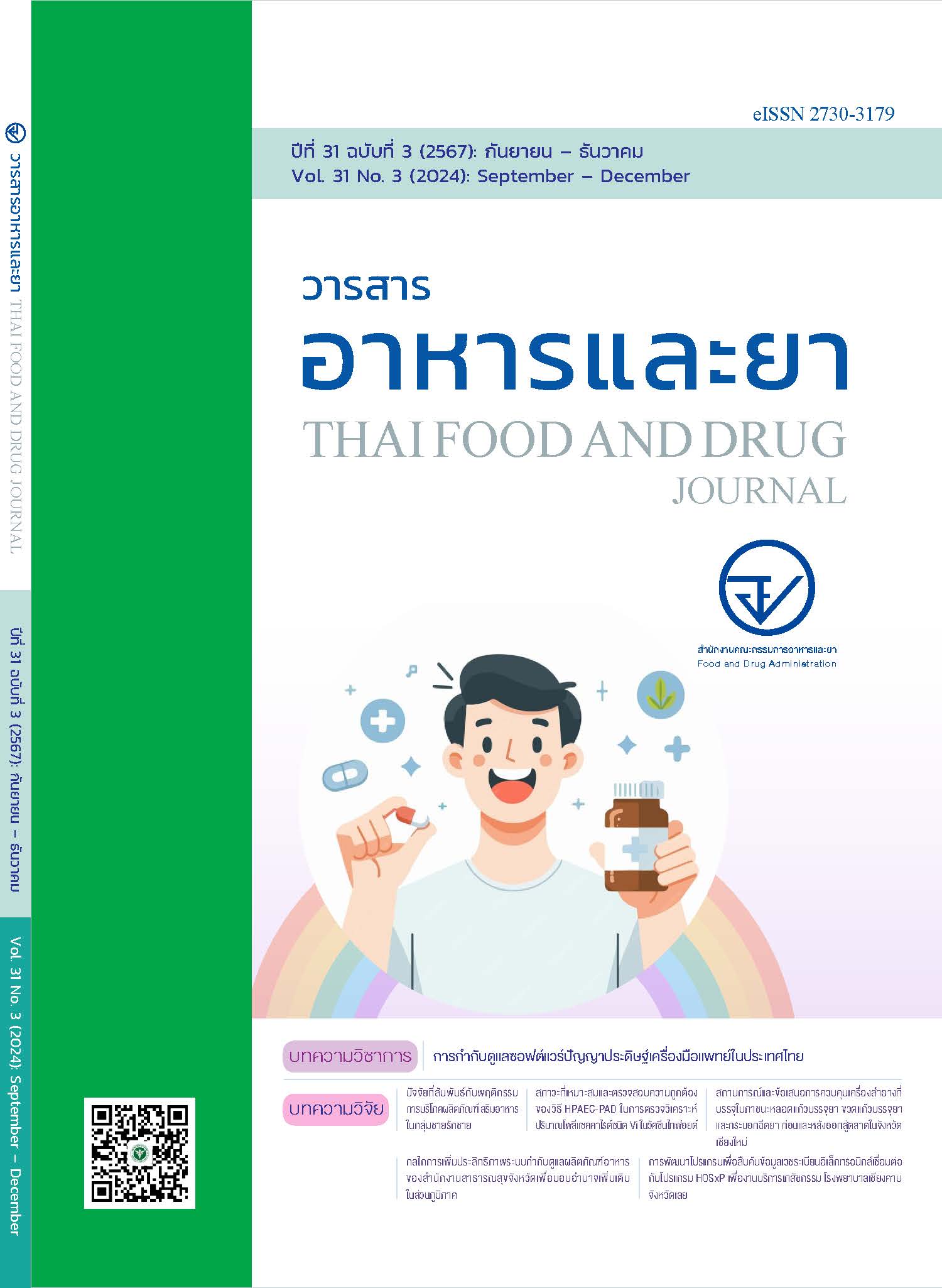ปัจจัยที่สัมพันธ์กับพฤติกรรมการบริโภคผลิตภัณฑ์เสริมอาหารในกลุ่มชายรักชาย
Main Article Content
บทคัดย่อ
ความสำคัญ: กลุ่มชายรักชายเป็นกลุ่มประชากรที่ให้ความสำคัญในค่านิยมด้านรูปลักษณ์ทางกาย เพื่อให้เป็นที่ยอมรับในสังคมและเป็นแรงดึงดูดทางเพศให้กับกลุ่มชายรักชายด้วยกันเอง จึงอาจสรรหาผลิตภัณฑ์เสริมอาหารเพื่อเป็นตัวช่วยเสริมให้มีสุขภาพและรูปลักษณ์ทางกายตามค่านิยมของกลุ่มชายรักชาย ดังนั้นกลุ่มชายรักชายจึงเป็นกลุ่มเสี่ยงที่อาจเกิดผลข้างเคียงที่เป็นอันตรายต่อสุขภาพจากการมีพฤติกรรมการบริโภคผลิตภัณฑ์เสริมอาหารที่ไม่เหมาะสม
วัตถุประสงค์: เพื่อศึกษาพฤติกรรมการบริโภคผลิตภัณฑ์เสริมอาหาร และความสัมพันธ์ระหว่างปัจจัยด้านคุณลักษณะส่วนบุคคล ปัจจัยนำ ปัจจัยเอื้อ และปัจจัยเสริมกับพฤติกรรมการบริโภคผลิตภัณฑ์เสริมอาหารในกลุ่มชายรักชาย
วิธีการวิจัย: การวิจัยครั้งนี้เป็นการวิจัยเชิงสำรวจภาคตัดขวางระหว่างเดือนธันวาคม 2566 ถึงกุมภาพันธ์ 2567 โดยประยุกต์ใช้ PRECEDE-PROCEDE Model ในขั้นตอนที่ 3 การประเมินด้านการศึกษาและนิเวศวิทยา ซึ่งประกอบด้วยปัจจัยนำ ปัจจัยเอื้อ และปัจจัยเสริม และทฤษฎีการกระทำด้วยเหตุผล (The theory of reasoned action) เป็นกรอบแนวคิดในการศึกษา คัดเลือกตัวอย่างจากกลุ่มชายรักชายที่เข้ารับบริการที่คลินิกเทคนิคการแพทย์ฟ้าสีรุ้งรามคำแหง สมาคมฟ้าสีรุ้งแห่งประเทศไทย จำนวน 318 คนที่สมัครใจ โดยใช้แบบสอบถามออนไลน์ (Google form) ชนิดตอบด้วยตนเองซึ่งประกอบด้วยปัจจัยด้านคุณลักษณะส่วนบุคคล ปัจจัยนำ ปัจจัยเอื้อ ปัจจัยเสริม และพฤติกรรมการบริโภคผลิตภัณฑ์เสริมอาหาร ใช้การวิเคราะห์ข้อมูลด้วยสถิติเชิงพรรณนา และหาความสัมพันธ์ด้วยสถิติทดสอบค่าสหสัมพันธ์เพียร์สัน (Pearson correlation coefficient) One-way ANOVA และ Independent t-test
ผลการศึกษา: ผลการวิจัยพบว่าคุณลักษณะของกลุ่มตัวอย่างส่วนใหญ่มีช่วงอายุระหว่าง 19-62 ปี มีรายได้เฉลี่ย 29,762.07 บาท จบการศึกษาระดับปริญญาตรี ร้อยละ 70.40 ไม่มีโรคประจำตัว ร้อยละ 74.80 ประกอบอาชีพเป็นพนักงานหรือลูกจ้างเอกชน ร้อยละ 60.40 ส่วนบทบาททางเพศของชายรักชายส่วนใหญ่ได้แก่ โบท คือเป็นได้ทั้งฝ่ายรุกและผ่ายรับ ร้อยละ 43.40 รองลงมาเป็นฝ่ายรุก และฝ่ายรับ ร้อยละ 36.50 และ 43.40 ตามลำดับ ด้านปัจจัยนำ ได้แก่ ค่านิยมด้านรูปลักษณ์ทางกาย มีค่าเฉลี่ย 4.16 จัดอยู่ในระดับสูง รองลงมาได้แก่ เจตคติต่อการบริโภคผลิตภัณฑ์เสริมอาหาร และการคล้อยตามกลุ่มอ้างอิง มีค่าเฉลี่ยที่ 3.57 และ 3.53 จัดอยู่ในระดับปานกลาง ด้านปัจจัยเอื้อในประเด็นของการเข้าถึงแหล่งจำหน่ายผลิตภัณฑ์เสริมอาหาร มีค่าเฉลี่ย 3.63 อยู่ในระดับปานกลาง ส่วนปัจจัยเสริมในเรื่องอิทธิพลของสื่อต่อการตัดสินใจบริโภคผลิตภัณฑ์เสริมอาหาร มีค่าเฉลี่ย 3.59 อยู่ในระดับปานกลาง เมื่อศึกษาถึงพฤติกรรมการบริโภคผลิตภัณฑ์เสริมอาหาร พบมีค่าเฉลี่ย 3.26 อยู่ในระดับปานกลาง นอกจากนั้น ยังพบว่าปัจจัยที่มีความสัมพันธ์ในทางบวกอย่างมีนัยสำคัญทางสถิติกับพฤติกรรมการบริโภคผลิตภัณฑ์เสริมอาหาร ได้แก่ ระดับการศึกษา (F=3.81, p-value = 0.023) ค่านิยมด้านรูปลักษณ์ทางกาย (r = 0.27, p-value < 0.001) เจตคติต่อการบริโภคผลิตภัณฑ์เสริมอาหาร (r = 0.16, p-value = 0.003) การคล้อยตามกลุ่มอ้างอิง (r = 0.43, p-value < 0.001) การเข้าถึงแหล่งจำหน่ายผลิตภัณฑ์เสริมอาหาร (r = 0.41, p-value < 0.001) และอิทธิพลของสื่อต่อการตัดสินใจบริโภคผลิตภัณฑ์เสริมอาหาร (r = 0.37, p-value < 0.001)
สรุป: กลุ่มชายรักชายมีพฤติกรรมการบริโภคผลิตภัณฑ์เสริมอาหารในระดับปานกลาง มีค่านิยมด้านรูปลักษณ์ทางกายในระดับสูง มีเจตคติต่อการบริโภคผลิตภัณฑ์เสริมอาหาร การคล้อยตามกลุ่มอ้างอิง การเข้าถึงแหล่งจำหน่ายผลิตภัณฑ์เสริมอาหาร และอิทธิพลของสื่อต่อการตัดสินใจบริโภคผลิตภัณฑ์เสริมอาหารในระดับปานกลาง ปัจจัยที่มีความสัมพันธ์ทางบวกกับพฤติกรรมการบริโภคผลิตภัณฑ์เสริมอาหารอย่างมีนัยสำคัญทางสถิติ ได้แก่ ระดับการศึกษา ค่านิยมรูปลักษณ์ทางกาย เจตคติต่อการบริโภคผลิตภัณฑ์เสริมอาหาร การคล้อยตามกลุ่มอ้างอิง การเข้าถึงแหล่งจำหน่ายผลิตภัณฑ์เสริมอาหาร และอิทธิพลของสื่อต่อการตัดสินใจบริโภคผลิตภัณฑ์เสริมอาหาร จากผลการศึกษาในครั้งนี้สามารถใช้เป็นข้อมูลในการออกแบบนโยบายและโปรแกรมทางสุขศึกษาและส่งเสริมสุขภาพ เพื่อส่งเสริมพฤติกรรมการบริโภคผลิตภัณฑ์เสริมอาหารในกลุ่มชายรักชายให้เหมาะสมต่อไป
Article Details

อนุญาตภายใต้เงื่อนไข Creative Commons Attribution 4.0 International License.
เอกสารอ้างอิง
Amnesty International Thailand. ทำความรู้จักกับ LGBTQI ตัวย่อที่มีความหมาย และประเด็นที่น่าสนใจความก้าวหน้าของกลุ่ม LQBTQI ในปี 2020 [อินเทอร์เน็ต]. กรุงเทพฯ: Amnesty International Thailand; 2564 [เข้าถึงเมื่อ 20 เม.ย. 2566]. เข้าถึงได้จาก:https://www.amnesty.or.th/latest/blog/860
กฤติณ เผือกขวัญดี. โภชนวิถีในการเลือกบริโภคอาหารเสริม กรณีศึกษากลุ่มชายรักชาย ในจังหวัดเชียงใหม่ [วิทยานิพนธ์ปริญญาสาธารณสุขศาสตรมหาบัณฑิต]. ลำปาง: มหาวิทยาลัยธรรมศาสตร์; 2564.
Carper TL, Negy C, Tantleff-Dunn S. Relations among media influence, body image, eating concerns, and sexual orientation in men: a preliminary investigation [Internet]. Body Image. 2010 [cited 2023 Apr 20]; 7(4):301-30. Available from: https://pubmed.ncbi.nlm.nih.gov/20739233/ doi:10.1016/j.bodyim.2010.07.002. Epub 2010 Aug 23. PMID: 20739233
เจษฎา พิมพ์สวัสดิ์. พฤติกรรมการอยู่อาศัยและรูปแบบที่อยู่อาศัยที่พึงประสงค์ของกลุ่มชายรักชายในกรณีศึกษา กลุ่มผู้มีรายได้ปานกลางค่อนข้างสูง [วิทยานิพนธ์ปริญญาเคหพัฒนศาสตรมหาบัณฑิต]. กรุงเทพฯ: จุฬาลงกรณ์มหาวิทยาลัย; 2564.
ปังปอนด์ รักอำนวยกิจ, ศิริพงศ์ ปาละกวงศ์ ณ อยุธยา. ความหลากหลายของกลุ่มผู้ย้ายถิ่นในประเทศไทย: มุมมองของประชากรและสังคม. พัฒนาการเศรษฐกิจปริทรรศน์ 2562;13(2):84-122.
ฐิติพร อินศร. การโฆษณาผลิตภัณฑ์เสริมอาหารที่ผิดกฎหมายในสื่อสังคมประเภทเฟซบุ๊กและข้อเสนอแนวทางบังคับใช้กฎหมายของพนักงานเจ้าหน้าที่. วารสารวิจัยและพัฒนาระบบสุขภาพ 2562;12(1):40-47.
Navarro VJ, Khan I, Björnsson E, Seeff LB, Serrano J, Hoofnagle JH. Liver injury from herbal and dietary supplements. Hepatology [Internet]. 2016 [cited 2023 Apr 20]; 65(1):363-373. Available from: https://www.ncbi.nlm.nih.gov/pmc/articles/PMC5502701/ doi:10.1002/hep.28813.
Li ZH, Zhong WF, Liu S, Kraus VB, Ahang YJ, Fao X, et al. Associations of habitual fish oil supplementation with cardiovascular outcomes and all cause mortality: evidence from a large population based cohort study. BMJ [Internet]. 2020 [cited 2023 Apr 20]; 368:m456. Available from: https://pubmed.ncbi.nlm.nih.gov/32131999/ doi:10.1136/bmj.m456
ไทยรัฐออนไลน์. หนุ่มนักศึกษาอยากผิวขาว ช็อกดับคาบ้าน คาดกินยาเกินขนาด [อินเทอร์เน็ต]. ไทยรัฐออนไลน์. 31 ธ.ค. 2560 [เข้าถึงเมื่อ 1 เม.ย. 2566] เข้าถึงได้จาก: https://www.thairath.co.th/news/local/east/1113207
เวิร์คพอยท์ทูเดย์. ผลชันสูตรชัด! หนุ่มปทุมฯตายเพราะสารพิษในอาหารเสริมลีน [อินเทอร์เน็ต]. เวิร์คพอยท์ทูเดย์. 25 พ.ค. 2561 [เข้าถึงเมื่อ 1 เม.ย. 2566] เข้าถึงได้จาก: https://d.dailynews.co.th/regional/645424/
Green LW, Kreuter MW. Health program planning: an educational and ecological approach. 4th ed: McGraw Hill: New York; 2005.
Fishbein MA. Ajzen I. Belief, attitude, intention and behaviour: an Introduction to theory and research. Addison-Wesley: Boston; 1975.
Wayne WD, Cross CL. Biostatistics: a foundation of analysis in the health sciences. 6th ed. John Wiley & Sons: 1995.
Best JW. Research in Education: New Jersey: Prentice – Hall; 1981.
กชพรรณ ธรรมไชย. การตัดสินใจซื้อผลิตภัณฑ์เสริมอาหารของผู้บริโภควัยทำงานในเขตกรุงเทพมหานครและปริมณฑล. กรุงเทพฯ: มหาวิทยาลัยศิลปากร; 2560.
Yager Z, O’Dea JA. Relationships between body image, nutritional supplement use, and attitudes towards doping in sport among adolescent boys: implications for prevention programs. J Int Soc Sports Nutr [Internet]. 2014 [cited 2024 March 18]; 11(1):13. Available from: https://www.ncbi.nlm.nih.gov/pmc/articles/PMC3986904/ doi: 10.1186/1550-2783-11-13. PMID: 24670105; PMCID: PMC3986904.
ธนวัฒน์ แสงสุนานนท์, ณิตชาธร ภาโนมัย. พฤติกรรมการบริโภคและการตัดสินใจเลือกซื้อผลิตภัณฑ์เสริมอาหารเพื่อสุขภาพและความงามของกลุ่มวัยผู้ใหญ่ที่ศูนย์บริการสาธารณสุขที่ 1 เทศบาลนครขอนแก่น อำเภอเมือง จังหวัดขอนแก่น. วารสารวิจัยและพัฒนาระบบสุขภาพ 2566;16(1):57-70.
เสกสรร วีระสุข, วรางคณา อดิศรประเสริฐ. พฤติกรรมผู้บริโภคผลิตภัณฑ์เสริมอาหารประเภทวิตามินในกรุงเทพมหานคร. วารสารบริหาธุรกิจศรีนครินทรวิโรฒ 2557;5(1):65-79.
ศิริพร ทิมาบุตร. พฤติกรรมการบริโภคอาหารเสริมของกลุ่มคนวัยทำงานในเขตกรุงเทพมหานคร. การประชุมวิชาการเสนอผลงานวิจัยระดับชาติและนานาชาติ ครั้งที่ 8 มหาวิทยาลัยราชภัฎสวนสุนันทา 2561: 2415-24.
ภัทรฤทัย เกณิกาสมานวรคุณ, สายพิณ ทับทิมดี, สรียา ศศะรมย์. การตัดสินใจเลือกซื้อผลิตภัณฑ์เสริม. อาหารของประชาชนในอำเภอพุทธมณฑล จังหวัดนครปฐม. วารสารวิชาการ สถาบันวิทยาการจัดการแห่งแปซิฟิค 2564;6(3):1-9.
ศศิวรรณ เดชคุณากร. พฤติกรรมการบริโภคผลิตภัณฑ์อาหารเสริมของกลุ่มวัยทํางาน ในอำเภอเมืองเชียงใหม่ (สารนิพนธ์ปริญญามหาบัณฑิต). เชียงใหม่: มหาวิทยาลัยเชียงใหม่; 2551.
ณัฐนรี ดิษฐาน. แรงจูงใจที่มีผลต่อการเลือกซื้อสินค้าประเภทผลิตภัณฑ์เสริมอาหาร ผ่านช่องทางพาณิชย์อิเล็กทรอนิกส์ (E-commerce) ของผู้บริโภค ในเขตกรุงเทพมหานคร (สารนิพนธ์ปริญญามหาบัณฑิต). กรุงเทพมหานคร: มหาวิทยาลัยมหิดล; 2565.
ยุพา ฤทธิสุทธิ์. ความสัมพันธ์ของพฤติกรรมการใช้สื่อ ที่มีผลต่อการตัดสินใจซื้อ ผลิตภัณฑ์เสริมอาหาร ของประชากรกลุ่มวัยทำงานและกลุ่ม ผู้สูงอายุในช่วงสถานการณ์ COVID-19 (การศึกษาค้นคว้าอิสระปริญญามหาบัณฑิต). กรุงเทพฯ: มหาวิทยาลัยรามคำแหง; 2563.


